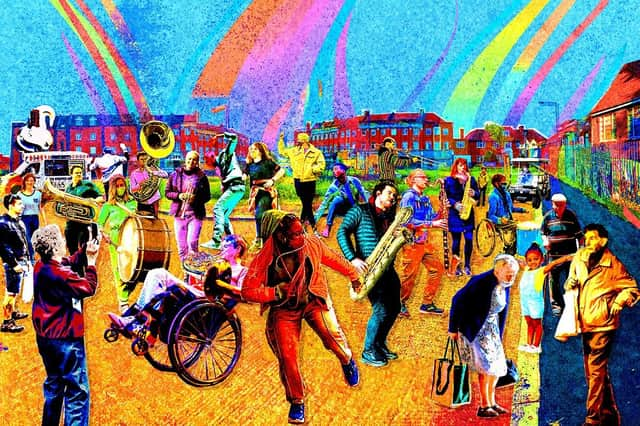Huge mobile human juke box will offer spectacular finale to Brighton Festival


He is inviting you out onto the streets to dance and sing along in a magnificent, cacophonous, communal karaoke – a massaoke, in fact.
Under the title SMOOSH!, the event will feature a high-energy wind and brass band and a troupe of dancers for an on-the-move performance of pop-karaoke classics – think Fatboy Slim, meets Kate Bush, meets Basement Jaxx, says Charles, the director of Paraorchestra. They will be in action over the final weekend of this year’s festival. On Saturday, May 28, they will focus on East Brighton. At 3.30pm, Route A will go from Swallow Court move down to Plaistow Close; at 5.30pm Route B will go from City Academy Whitehawk and move down to The Meadway. On Sunday, May 29, they move to The Riwaq, Hove Seafront. At 2pm, Route A will go from the Riwaq to Hove Plinth; and at 4pm Route B will go from Hove Plinth to the Riwaq. The parade will move along the seafront esplanade
Advertisement
Hide AdAdvertisement
Hide Ad“This is an idea that came out of the misery of the lockdown and the sense of isolation and loneliness that people felt. Humans are sociable people. We need to be with other people and I thought why don't we offer a great big shiny new show about all the music that everybody loves and at the same time create a really exciting large-scale ensemble that is fully choreographed. The musicians have a brilliant flexibility and they love the thought of doing it. They had such an exciting experience doing it in a suburb of Bristol last autumn and now we delighted to be doing this now in Brighton.
“I formed Paraorchestra for the 2012 Paralympics in London which was such an exciting time when the whole world was focused on this country. There was such a buzz building up to it, and for the Paralympic movement it was an absolute game changer. No one could ever claim that the Paralympics were anything other than world-class sport rather than some soft and warm attempt to give disabled athletes something to do. It was such an important event. But music is still in the dark ages when it comes to inclusivity. I've spent 30 years conducting around the world and I can count on the fingers of one hand the number of disabled musicians that I have worked with.”
Paraorchestra was originally an all-disabled orchestra, as a way of shining a light on the issue, but as Charles says, there is no interest in creating a ghetto of disabled musicians: “The whole emphasis has to be on integration and that is what we have done. We want the orchestra to be a reflection of our modern society, a healthy balance of disabled and non-disabled, a healthy balance of skin tones. At the end of the day it is about levelling the playing field and rubbing out injustice, about making sure people don't say someone can't do something just because they don't fit a certain mould.”